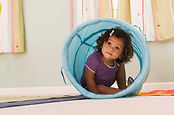Parent-Child Interaction Therapy with Toddlers (PCIT-T) is an early intervention therapy that involves coaching parents while they interact with their 6 to 30-month-old child. Utilizing play therapy parents are coached in the use of therapeutic parenting practices proven to decrease challenging behaviors, improve children’s language, and encourage young children to follow directions. Parents over-practice the “PRIDE” skills (praise, reflection, imitation, description, and enjoyment) until they obtain goal criteria.

The therapist observes the caregiver and child together using a webcam while providing live coaching of PCIT skills either on screen (for deaf parents) or using a headset or a bluetooth earbud in the parent's ear (for hearing parents). Parents report feeling more comfortable in their ability to manage their child's emotions because they get live coaching while they are home. This approach helps parents successfully continue with healthy behavior management strategies long after PCIT graduation!

-
Tantrums
-
Aggression (e.g., hitting, biting, pinching)
-
Fussiness (e.g., screaming, whining, crying)
-
Anger, frustration, head-banging
-
Attachment difficulties (e.g., rejection of parent, difficult to comfort)
-
Separation anxiety or withdrawal from parent
-
Developmental concerns (e.g., socioemotional, language problems)
-
Child abuse and neglect
-
Parental stress (e.g., anxiety, dissatisfaction, difficulty coping, lack of confidence)
Child-Directed
Interaction
CDI
Parent-Directed
Interaction
PDI


Caregivers are taught the PRIDE skills:
Praise, Reflect, Imitate,
Describe and Enjoyment. These skills promote positive child behaviors.
Caregivers learn to use effective emotion regulation strategies with their child. The PCIT therapist helps caregivers manage their child’s behaviors in many settings.
What are the two treatment phases of PCIT-T?

_edited_edited.jpg)